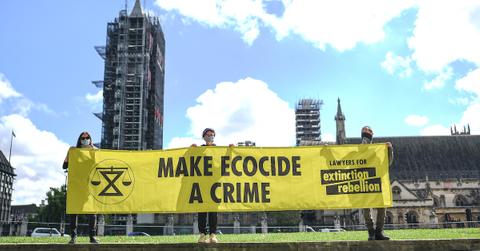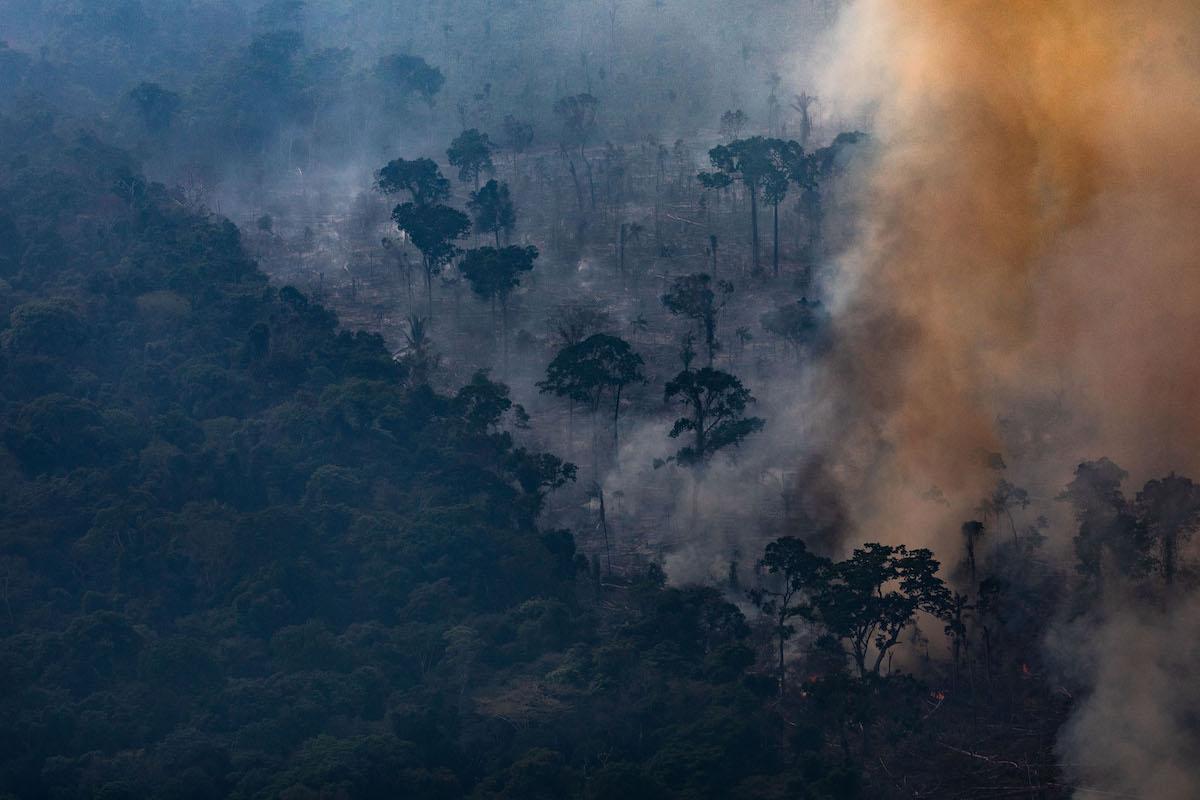Expert Panel Defines "Ecocide" — and Hopes to Criminalize It
Published June 24 2021, 12:39 p.m. ET

Members of Extinction Rebellion hold a banner reading "Make Ecocide a Crime" in Parliament Square on Aug. 28, 2020 in London, England.
It’s common practice for large industries and governments to directly damage the environment in the name of making money — and often without repercussions. To combat that, an expert has just published an official definition of ecocide, which they hope will help make the practice a crime. But what is ecocide, exactly?
What is ecocide? A new definition has been established.
The word ecocide has floated around environmental circles for years, but it wasn’t until this week that a legal definition for the term was officially set. The Stop Ecocide Foundation, a Netherlands-based legal organization that was founded in 2017 with the goal of making ecocide a crime, recently hired an Independent Expert Panel for the Legal Definition of Ecocide.

After six months of discussions, the panel, composed of 12 renowned environmental and criminal lawyers, finally published a document this week with their definition of ecocide:
“For the purpose of this Statute, ‘ecocide’ means unlawful or wanton acts committed with knowledge that there is a substantial likelihood of severe and either widespread or long-term damage to the environment being caused by those acts.”
Basically, ecocide is when someone carries out an act that causes significant environmental damage, despite being aware of that environmental risk. Ecocide is a portmanteau of “ecological genocide” — a phrase that’s perhaps more visceral than ecocide itself.
The panel hopes to criminalize ecocide.
The foundation hopes that this clear definition will prompt the International Criminal Court (ICC) to recognize ecocide as an international crime, and therefore begin charging and prosecuting various industries, corporations, and governments for ecocide. If ecocide becomes an international crime, the people at the top of these entities will (hopefully) change their policies, for fear of being charged with criminal activity.
“This is an historic moment,” Stop Ecocide Foundation Chair Jojo Mehta said in a press release. “This expert panel came together in direct response to a growing political appetite for real answers to the climate and ecological crisis. The moment is right — the world is waking up to the danger we are facing if we continue along our current trajectory.”
Examples of ecocide
Ecocide occurs on planet Earth every day — a few general examples include drilling for fossil fuels, clearing land (deforestation) for animal agriculture or palm oil plantations, and dumping toxic waste and crude oil into the ocean. The organization End Ecocide on Earth has a thorough list of specific ecocide examples, if you’d like to learn more.
Greta Thunberg has spoken out about ecocide.
Renowned teenage climate activist Greta Thunberg has spoken out about ecocide on a few occasions. In July 2020, Thunberg won the Gulbenkian Prize for Humanity, which comes with a 1 million-euro award. Thunberg donated 100,000 euros of that prize money to the Stop Ecocide Foundation.
The following month, Thunberg and three fellow teen climate activists delivered a series of demands for protecting the climate to German Chancellor Angela Merkel in a special meeting with her in Berlin. A key demand was to criminalize ecocide — as well as to divest from fossil fuels, end all fossil fuel subsidies and investments, and more.
Until ecocide is criminalized by the ICC, corporations — and even government leaders — will continue getting away with destroying the planet. The climate crisis is one of the greatest threats to life on Earth, and hopefully this definition of ecocide will bring us a step closer to the ICC officially making ecocide a crime.